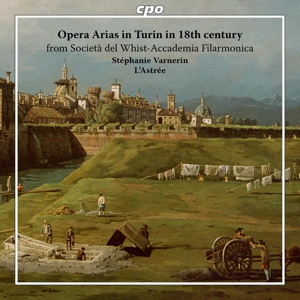
Opera Arias in Turin in 18th Century
Stéphanie Varnerin (soprano), L’Astrée
Texts included with English and German translations
rec. 2023, Odeo del Palazzo del Circolo del Whist, Società Filarmonica di Torino, Italy
cpo 555 664-2 [65]
Among major urban centres in the Italian peninsula, Turin was relatively late in getting an opera house – the Teatro Regio was opened in 1740, and the Teatro Carignano followed in 1753. Both quickly became prominent institutions, and they still exist, albeit in rebuilt forms. The arias selected for this compilation, from scores in the archive of Accademia Filarmonica di Torino, are extracted from operas which were given, or even premiered, at those two houses in the second half of the 18th century, the earliest one here from 1753.
By that stage opera seria had largely given way to opera buffa and all the arias on this disc are couched in the more light-hearted vein of the latter genre. Furthermore, they all deal, in whimsical fashion, with the travails, heartaches, or amusements of love, as seen from the perspective of female lovers caught up within those situations, or coquettish maids and servants looking on to those experiencing such things. Stéphanie Varnerin cultivates a suitably bright, ebullient vocal tone to match the music’s mood which, in conforming to the style of the times, is generally upbeat even when the text describes frustration or irritation. Her strength lies in those more lively pieces, such as the arias from Cocchi’s Andromeda and by Galuppi, which are notably vibrant, attracting the odd flutter in the voice apart from their generally efficient executions. She displays the knowingness of a Despina in Paisiello’s ‘Ecco assisa al botteghino’, and in ‘Per voi visino amabile’ from that composer’s La Frascatana, she achieves a certain intensity in delivery, as though she is ogling the lovers with her singing as much as any behaviour on stage.
Piccinni’s ‘Che tortora io sono’ and – perhaps surprisingly given that it comes from a French opera – Grétry’s Air de la fauvette – demand the most agile technique for their coloratura runs as the most virtuosic arias on the disc and closest to the displays of vocal skill called for in the older style of opera seria. Varnerin is in control of that, but such higher and fast notes tend to suffer from a constriction in tone and don’t open out fully. In some of the simpler settings she adopts a slightly less colourful, extrovert character, which is to the music’s advantage to some extent, although the performances then lack a little dramatic and timbral variety.
The selected arias make for a charming compilation, but across the whole disc it becomes thematically and stylistically a rather uniform programme, especially since the seven-strong ensemble L’Astrée perform as one to a part, which means there is little room for textural diversity. Arias tend to be driven by the repeated notes of the robust bass line, although they ease up a little in ‘Che tortora io sono’, and there is an affecting violin solo for Alessandri’s ‘Placida riposa omai in lieta calma il mare’. As a group, L’Astrée offer lean, playful intimacy in these historically informed readings at 18th century pitch, but anything grander is largely missing. The recital offers an enjoyable glimpse of a once energetic operatic centre, and is worthwhile for that alone, even if neither the repertoire nor the performances here dazzle.
Curtis Rogers
Buying this recording via a link below generates revenue for MWI, which helps the site remain free.



Contents
Giovanni Paisiello (1740-1816)
La Frascatana (1774) – ‘Per voi visino amabile’
La modista raggiratrice, ossia La scuffiara (1787) – ‘Ecco assisa al botteghino’
Felice Alessandri (1747-1798)
Argea (1772) – ‘Placida riposa omai in lieta calma il mare’
Giuseppe Scolari (1720-1774)
La Cascina (1755) – ‘L’amante tortorella’, ‘Con cento pastorelli’
Gioacchino Cocchi (1712-1796)
Il pazzo glorioso (1753) – ‘D’un novello ardor’;
Andromeda (1755) – ‘Per placar gli astri tiranni’
Baldassare Galuppi (1706-1785)
Il filosofo di campagna (1754) – ‘Ogni anno passa un anno’, ‘Una ragazza che non è pazza’
Niccolò Piccinni (1728-1800)
La buona figliola (1760) – ‘Vieni al mio seno’;
La schiava riconosciuta (1765) – ‘Che tortora io sono’
Giovanni Borghi (1738-1796)
Adriano in Siria (1758) – ‘Odo il tuono’
Pierre-Alexandre Monsigny (1729-1817)
Le déserteur (1769) – ‘Dans quel trouble’
André-Ernest-Modeste Grétry (1741-1813)
Zémire et Azor (1771) – Air de la fauvette

















